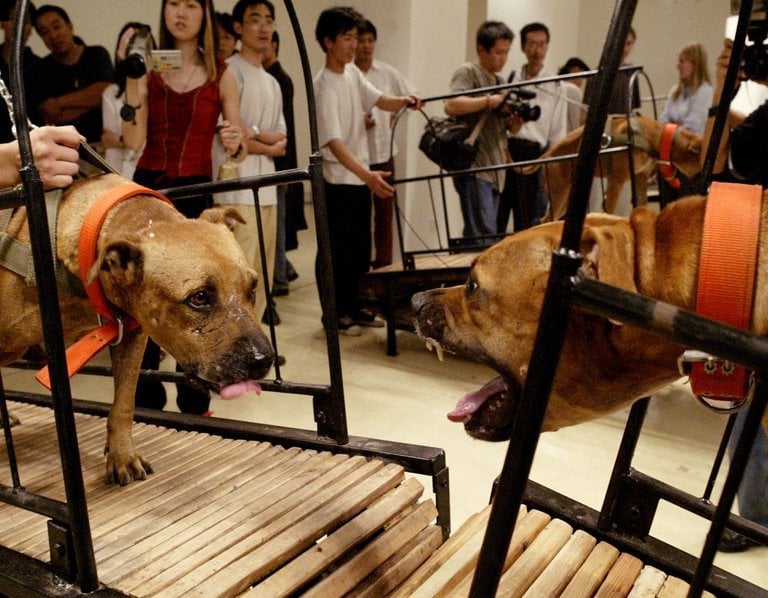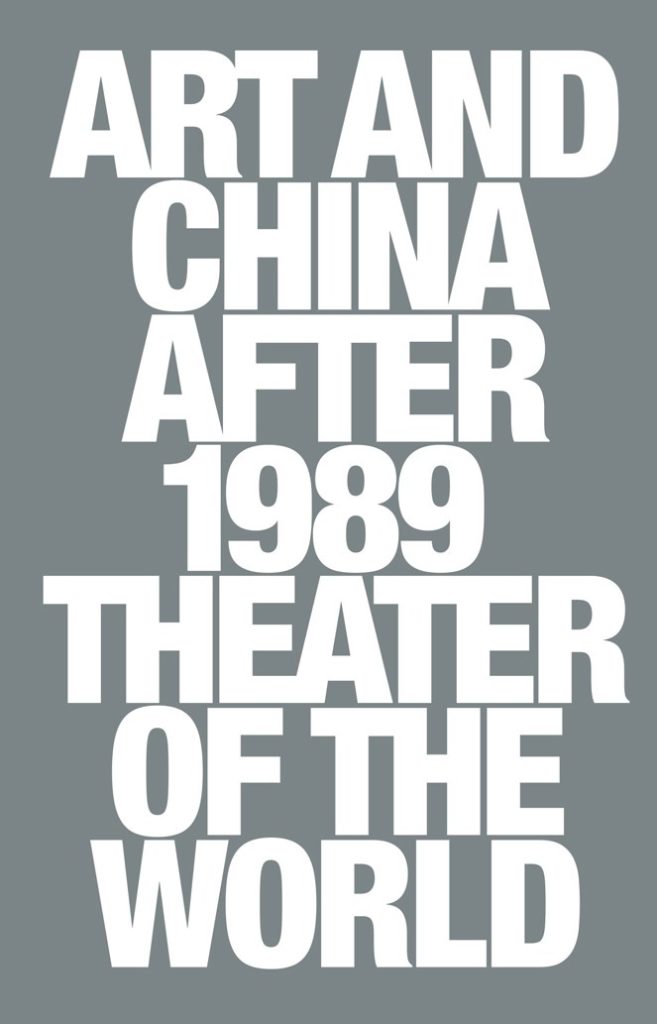Art & Exhibitions
The Guggenheim’s Massive China Show Is Already Attracting Criticism From Animal Rights Groups
The Guggenheim denies that animals were harmed in the making of the work.

The Guggenheim denies that animals were harmed in the making of the work.

Sarah Cascone

Animal lovers are none too happy with New York’s Solomon R. Guggenheim Museum. The institution is under pressure to pull a video featuring snarling pit bulls from its upcoming exhibition “Art and China after 1989: Theater of the World,” a major presentation of Chinese art due to open on October 6.
Sun Yuan and Peng Yu’s Dogs That Cannot Touch Each Other is a seven-minute-long video filmed during a performance at a Beijing museum in 2003, according to the New York Times, which first reported the recent criticism.
In the performance, four pairs of American pit bulls are placed face to face on non-motorized treadmills. The dogs, which appear aggressive, are unable to reach one another, no matter how hard they try.
An online petition calling on the Guggenheim to remove all works that involve animals from the show has garnered nearly 21,340 signatures as of publication time. The museum has also received calls and emails from animal rights activists requesting the video’s removal.
The museum, however, is standing by the work’s inclusion. “We recognize that the work may be upsetting,” it said in a statement. “Contrary to some reports, no fighting occurred in the original performance and the presentation at the Guggenheim is in video format only; it is not a live event.”

The poster for “Art and China after 1989: Theater of the World,” set to open next month at the Guggenheim. Courtesy of the Solomon R. Guggenheim Museum.
“Were the dogs being abused? The answer should be no. These dogs are naturally pugnacious,” Sun said in an interview with Paul Gladston in his 2016 book Deconstructing Contemporary Chinese Art. “For those who consider this animal abuse, I don’t understand what they are protesting about.”
In the statement, the museum added that the video reflects “the artistic and political context of its time and place.” The work is “an intentionally challenging and provocative artwork that seeks to examine and critique systems of power and control. The curators of the exhibition hope that viewers will consider why the artists produced it and what they may be saying about the social conditions of globalization and the complex nature of the world we share.”
The exhibition traces the development of Chinese art between two moments in history when all eyes were on the country: the Tiananmen Square protests of 1989 and the 2008 Beijing Olympic Games. Featuring more than 150 conceptual and experimental works, the show “explores the end of the Cold War, the spread of globalization, and the rise of China,” according to the museum’s statement.
Dogs That Cannot Touch Each Other isn’t the only piece in the show with the potential to upset animal rights activists. The exhibition’s title is taken from another work that involves animals, Huang Yong Ping’s Theater of the World (1993), a large, illuminated enclosure that houses live insects, amphibians, and reptiles that will fight and eat each other as viewers look on.
In 2007, the Vancouver Art Gallery removed the animals from the piece at a retrospective for the artist in response to concerns from the local humane society. “The work functions as a metaphor for the conflicts among different peoples and culture—in short, human existence itself,” the museum wrote of the work.
In a statement at the time, Huang expressed his disappointment with the humane society, saying, “They completely ignored the concept and ideology behind this particular art work, citing instead the doctrines of so-called ‘animal rights’ that violently interfere with the rights of an art work to be freely exhibited in an art museum.”
UPDATE: artnet News received the following comment from PETA president Ingrid Newkirk.
Responsible galleries and exhibitors shouldn’t be so afraid of saying no to art that treats living, feeling beings as if they were objects—and as if our society hasn’t had its eyes opened to animals’ sensitivity and the need to protect them from harm. Sensationalistic works that abuse animals are simply unacceptable in this day and age. No one needs to see animals inconvenienced, let alone tormented and goaded, for an artist to make a simple point that can be made in other ways or not at all.
The American Kennel Club also expressed their opposition to the work in a statement emailed to artnet News.
The American Kennel Club is deeply concerned about the “Dogs Cannot Touch Each Other” video that is a part of the upcoming “Art and China after 1989: Theater of the World” exhibit at the Guggenheim. Dog fighting is unacceptable and should not be displayed in any manner and certainly not as art. Depictions of animal cruelty are not art. Using live dogs in depictions of animal cruelty is not art, nor is it healthy for the dogs involved. It creates a perilous, damaging and stressful environment. Dogs are our sacred companions and as advocates for them and their protection, we strongly urge the Guggenheim to reconsider including this piece as part of their exhibition.
“Art and China after 1989: Theater of the World” is on view at the Solomon R. Guggenheim Museum, 1071 5th Avenue, October 6, 2017–January 7, 2018.